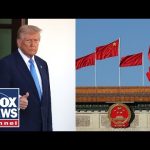President Trump’s bold tariff plan is shaking up global trade and putting America first. Commerce Secretary Howard Lutnick says these tariffs are here to stay, calling them a “national security issue” to protect U.S. factories and jobs. The move aims to end decades of foreign countries “ripping us off” while rebuilding critical industries like medicine and semiconductors.
The U.S. is done playing nice with nations that exploit unfair trade deals. Lutnick slammed China for dodging past tariffs by rerouting goods through other countries, which is why even remote places like the Heard and McDonald Islands face new taxes. “If you leave anything off the list, countries will find loopholes,” he explained. The 10% baseline tariff on all imports forces every nation to renegotiate terms that favor American workers.
Markets panicked after the announcement, but Lutnick urged Americans to “hang tough.” He compared the tariffs to “medicine” needed to heal the economy, arguing that temporary price hikes will lead to lasting growth. Over 50 countries have already rushed to negotiate, fearing lost access to America’s massive consumer market. The administration paused hikes for 90 days to give allies a chance to offer better deals—proof that Trump’s toughness works.
While most countries get a negotiation window, China faces a harsh 145% tariff. Lutnick accused China of refusing to play fair, noting they’ve “had no interest in treating America fairly.” This hardline approach isolates China economically, forcing companies to ditch cheap overseas labor and build factories in the U.S. instead.
Critics call the tariffs reckless, but conservatives praise Trump for finally tackling the $1.2 trillion trade deficit. “We’re paying away our future,” Lutnick said, stressing that America can’t afford to keep importing more than it exports. The plan mirrors Trump’s 2016 promises, proving he’s a leader who “does what he says.”
The stock slide reflects Wall Street’s addiction to cheap foreign labor, but real Americans care more about steady jobs than rich investors. Lutnick highlighted “trillions” in new U.S. factory investments, which will employ blue-collar workers left behind by globalization. “American workers are more expensive, but they’re better,” he said, slamming the old mindset that prioritized profits over people.
European leaders pretend to offer “zero tariffs” but still block U.S. farm goods. Lutnick sees through their tricks, warning that half-measures won’t cut it. The tariffs force honesty, replacing vague promises with concrete deals. Meanwhile, U.S. voters overwhelmingly distrust trade with China, with 46% believing Beijing benefits more—proof Trump’s stance matches public opinion.
The era of weak trade deals is over. Lutnick vows there’s “no postponing” this America-first reset, which prioritizes national security and middle-class jobs over globalist agendas. As factories return and wages rise, the administration bets voters will forgive short-term sticker shock for long-term prosperity. For Trump, it’s all about delivering what he promised: a country that’s strong, independent, and finally in control.




